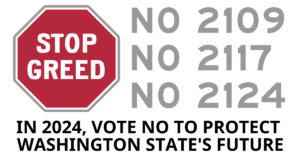The following is the prepared testimony of Permanent Defense Chair and Northwest Progressive Institute Executive Director Andrew Villeneuve on two initiative process reform bills considered by the House State Government & Tribal Affairs Committee.
Chairman Hunt and Members of the Committee:
The staff of the Northwest Progressive Institute, a regional think tank devoted to advancing the common good through ideas and action, would like to express our collective thanks to you for considering two bills today that would improve the integrity of the initiative process: SHB 2019, which would require signature gatherers of ballot measure petitions to sign petition declarations under oath, and HB 2601, which would require signature gatherers to register with the state.
In recent years the number of initiatives and referenda submitted to the people annually has grown in number, aided by the rise of a for profit signature gathering industry. With half a million dollars, any individual or group willing to spend the money can force a public vote on their idea, regardless of its true popularity.
Requiring the many independent contractors who are paid to circulate petitions to register with the state will strengthen the spirit of the initiative process by providing more transparency. The people of Washington State have repeatedly affirmed that an open political process is important; in 1971, the vote to approve the creation of the Public Disclosure Commission was an overwhelming 72%.
Almost every state in America with the initiative and referendum process has established regulations to protect their powers of direct democracy from fraud and abuse.
Washington is one of the few that has not, and it’s time to change that.
Article II, Section II of our state Constitution explicitly reserves the initiative and referendum powers to the people, and more specifically, “we the people of the state Washington” – the very first words in the preamble of our most cherished and foundational document.
Despite this clear intent, it is possible today for any person to circulate a petition in Washington State, because the business of signature gathering is unregulated. Petitioners don’t have to reside here, they don’t have to be registered to vote, and they don’t even have to be U.S. citizens.
Montana has addressed this issue by requiring petitioners to be residents. Residency is defined as “the union of act and intent” to reside and continue to reside in Montana.
(A full list of states with residency requirements can be found at this link.)
Our organization routinely receives reports from alarmed Washingtonians who have stories to share about their encounters with paid petitioners. Store managers have told us about out-of-state petitioners setting up shop in front of their entryways without permission, aggressively pestering customers for signatures. Activists have spoke of paid signature gatherers trying to trick them into signing multiple initiatives by falsely informing them their signature is required twice. Suspicious citizens have reported petitioners becoming irritated and unresponsive when they ask for more information about the initiative or referendum in question.
The evidence that we’ve received clearly suggests a need for investigation…and reform.
The Legislature has a duty to the people of Washington State to protect and enhance our tradition of direct democracy, and these bills are an excellent step towards greater accountability and public confidence in the process. We look forward to working with the Committee to refine and improve this legislation, and we thank all of you for your public service to our state.


